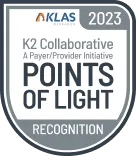
In our Ecosystem Explorer Series, we interview leaders from organizations who are advancing access to health data. Today’s interview is with Andrew Hadd, PhD, MBA, Head of Data Product Strategy & Strategic Partnerships at Invitae.
Andrew Hadd is the Head of Data Product Strategy & Strategic Partnerships at Invitae. In this role, he oversees the commercial product strategy and go-to-market activities across the genetic & clinical data business supporting partnerships with biopharma, healthtech, health systems, and patient advocacy. Prior to this role, Andrew oversaw the partner management team for the somatic oncology business at Invitae supporting biopharma clinical trials leveraging minimal residual disease technologies. He previously spent time in academic medical center innovation offices supporting early-stage technology commercialization and startup company formation for therapeutic and diagnostic technology development. Andrew started his career in medical genetics within a clinical diagnostic lab, building out the portfolio of gene panels and clinical exome for rare diseases. He has a PhD in biochemistry from Oregon Health & Science University.
Invitae is a leading medical genetics company trusted by millions of patients and their providers to deliver timely genetic information using digital technology. Invitae's genetics experts apply a rigorous approach to data and research, serving as the foundation of their mission to bring comprehensive genetic information into mainstream medicine to improve healthcare for billions of people. Through their biopharma partnerships, Invitae aims to advance research for cancer and rare diseases and expand access to precision therapies.
Introduction to genomics data
Let’s start with the basics. What is genomics data, and why is it important to healthcare researchers?
Genomics data are the output from sequencing an individual’s DNA. The genetic data relates to the genetic sequence of that individual, describing genes and variants identified, and where those genetic variations are positioned in the genome. The DNA sequence will have an impact on an individual's phenotype, traits, and response to environmental stresses. From a healthcare perspective, many human diseases are impacted by genomic variation - ranging from complex disorders (e.g. hypertension) and cancer to rare diseases. Many precision therapies target a genetic mutation that drives the disease and its progression.
Diving in further, what is Invitae’s involvement with genomics data? How does it fit in with your company’s mission?
Invitae is a leading medical genetics company that provides genetic tests to patients in support of their clinicians’ management of disease and genetic risk. We have sequenced over 4 million individuals since our founding. Invitae has an ambitious goal of democratizing clinical genetic testing with a focus on improving an individual's health. Through this mission, we steward a substantial amount of genomic and clinical data. For patients who have appropriately consented to sharing their de-identified data for research, we utilize this data to improve our understanding of disease biology, DNA interpretation, and to support the development of precision therapies.
The value and applications of genomics data
It’s been 20 years since the conclusion of the Human Genome Project, a landmark effort to sequence the entire set of genetic instructions found in our cells. How has genomics data science evolved since then, and what practical applications has it enabled for healthcare researchers?
Since the Human Genome Project, the development of genetic research has improved exponentially. One of the biggest improvements has been a sharp decrease in sequencing costs, and with that have come advancements in bioinformatics and data science methods to manage and analyze these data. Genomic analysis and our understanding of disease biology have allowed us to leverage DNA to improve how we diagnose, treat, and prevent disease.
Across the industry, we’re seeing excitement and optimism for the applications of big data and AI/ML on healthcare research – from enabling advanced analytics on multimodal data to enhancing models for rare disease diagnosis. How has the advancement of AI impacted genomics?
AI has and will continue to have an impact on genomic data in various use cases within a healthcare setting. One example would be leveraging AI/ML to identify novel gene-disease associations and genomic signatures related to a disease. The Invitae team works with multiple partners, including biopharma researchers, to leverage these data to identify novel therapeutic targets and genetic associations with disease to support diagnostic purposes.
Additionally, AI/ML can support refining the functional impact of genetic variants. This is especially important for interpreting and classifying variants of uncertain significance (VUS), which are variants that have limited data to determine if they are pathogenic or benign. From a clinical diagnostic perspective, clinicians have insufficient evidence to adjust patient care with VUSs. AI/ML has supported VUS resolution by combining genomic, clinical, and other molecular biology datasets into models to further resolve VUSs towards a more precise classification, thus working to improve diagnoses and development of precision therapies. Invitae is a leader in variant interpretation and has interpreted >2 million unique variants.
Building on the concept of connecting genomics data with other types of data, what value does genomics data add when connected with real-world or clinical data? What use cases are unlocked?
Genomic data alone is certainly not enough and needs to be augmented with complementary data, such as patient demographics, EHR, imaging, and claims/Rx. The value of the genetic data added to clinical and real-world data allows one to add more precision within the analyses. For example, analyzing claims/Rx data alone has proven powerful to assess patient journeys, but in rare disease, there is often no precise diagnosis code to confirm if a patient has a rare disease or not, which is important for understanding prevalence, health economic studies or disease burden analysis.
Adding genetics can power these studies significantly, allowing a precise patient population definition, refining inclusion/exclusion criteria for trials, targeted understanding of disease prevalence, but also excitingly, supporting target discovery. This is where a partnership with Invitae and Datavant is so exciting as it will allow researchers to unlock the power of genomics data across the value chain of supporting patient diagnoses, outcomes, and therapeutic development by coupling the DNA data agnostically with other complementary datasets.
Could you provide some real examples of how genomics data has been connected with real-world or clinical data to improve patient care or research outcomes?
Invitae has multiple partnership studies with biopharma researchers utilizing genomic data and real-world clinical data to identify novel genomic-based drug targets through phenotypic association studies. Genetic and real-world clinical data have also been used to study disease burden and health outcomes demonstrating how testing earlier quickens both clinical diagnosis as well as time for intervention. Additional studies have been used to identify phenotypic enrichment sub-segmented by genetic variations, identifying a spectrum of disease phenotypes driven by different genetic variants within a gene. This can be extremely powerful in translational research and clinical trial design.
To protect patient privacy and minimize the risk of patient re-identification, protected health information must be de-identified in accordance with HIPAA’s Privacy Rule before being used for many research applications. Are there unique challenges with de-identifying genomics data? What’s Invitae’s approach to patient privacy?
Patient privacy and consent are core tenets at Invitae. Patients own their data and have the ability to manage their consent for research purposes. Relative to de-identification, Invitae works with biostatisticians to confirm and minimize the risk of identifiable information from the genetics.
Innovations and future opportunities
Beyond AI/ML, are there any other technological innovations or trends that you find particularly promising for healthcare?
Relative to genomics data and healthcare, there is still substantial blue ocean space in multi-omics combining the phenotypic, DNA-based genomic data along with RNA and protein datasets. Combining all of these data together will further power the flywheel of our understanding of disease and fundamental biology. In addition, there is still a tremendous amount of opportunity to improve and drive adoption of clinical decision support (CDSs) tools and incorporate genetics into these tools. CDSs supporting genetics and diagnostic testing are a critical piece in the evolution of digital health moving healthcare towards personalized health.
Let’s look out 30 years. How do you hope genomics data will be used by and impact the healthcare community by the year 2050?
From my perspective, in 30 years, an individual will have their genome sequenced early in life, and it will be fully integrated within their health record. But importantly these data will be used to not only support diagnosis and genetic risk of disease but to support preventative health tailored to that personalized health plan. The field of genomics has advanced rapidly since the completion of the Human Genome Project, but we’re still at the tip of the spear for what is possible, and I’m excited to witness the groundbreaking efforts to leverage genetics to improve human health.
Thanks for the interview! Do you have any recommended resources for readers who want to learn more about genomics data or Invitae?
To learn more about Invitae’s testing process, please visit our online education center.





.svg)









